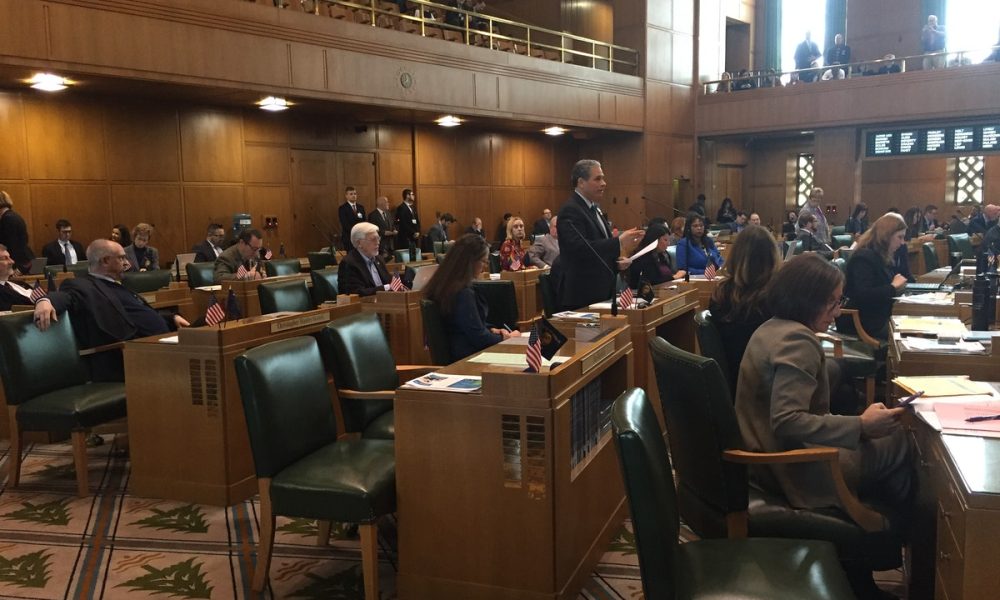 Mark Meek speaking on the House floor about the rent control bill Tuesday. (Paris Achen/Oregon Capital Bureau)
Mark Meek speaking on the House floor about the rent control bill Tuesday. (Paris Achen/Oregon Capital Bureau)
SALEM – House Speaker Tina Kotek on Tuesday finally accomplished her longstanding goal to protect tenants from abusive landlords with passage of sweeping rent control legislation.
The House voted 35-to-25 to cap annual rent increases to 7 percent, plus the change in the consumer price index, and restrict no-fault evictions. The legislation, Senate Bill 608, now goes to Gov. Kate Brown, who has said she would sign it. Her signature would institute the first statewide rent control in the country.
“This new law is one of many actions the legislature needs to take to address the housing crisis in Oregon,” said Lisa Morawski, a spokeswoman for Brown. “While it will provide immediate relief, we need to focus on building supply in order to address Oregon’s housing challenges for the long term.”
Kotek crafted the bill to protect tenants from steep rent increases and prevent large-scale evictions that have displaced Oregonians, especially in the Portland area.
But the rent limits don’t apply to rental properties built within the past 15 years, a measure meant to encourage housing development in the state.
The legislation allows certain no-fault evictions when a landlord wants to sell, upgrade or move into a property but requires landlords with larger holdings – five units or more – to pay a tenant a relocation fee equaling one month’s rent.
Tenants may sue the landlord when there is a violation and receive damages equal to three months’ rent.
The legislation passed mostly along party lines with Democratic Reps. David Gomberg of Neotsu, Caddy McKeown of Coos Bay and Brad Witt of Clatskanie voting against the bill.
The Senate passed the bill two weeks ago 17-11.
Debate on the bill on the House floor lasted for more than an hour Tuesday, with several Republicans opposing it and Democrats speaking in favor.
Rep. Ron Noble, R-McMinnville, noted that the rent cap is higher than the average rent increase in Oregon between 2016 and 2017. Between the end of 2016 and the end of 2017, rents increased statewide by 0.8 percent and in Portland, decreased by 1.5 percent.
“What this bill purports to do is provide a solution for our problem,” Noble said.
Yet the 7-percent cap would have little effect on low-income renters at risk of becoming homeless, Noble said. Meanwhile, he said, the new policy could scare off investors and prompt landlords to sell their residential units to homeowners, decreasing the rental supply.
Rep. Mark Meek, D-Gladstone, a landlord and Realtor, presented the bill on the House floor Tuesday, saying its aim is to protect tenants.
“In some cases, some tenants did not receive rent increases; in other cases, tenants received on the level of 20 percent and 40 percent rent increases,” Meek said. “While I know that we can’t protect everybody and not everybody needs protecting, the folks we are trying to protect are the people who would be displaced and would be homeless.”
Kotek attempted to pass tenant protections in 2017 via House Bill 2004. The 2017 legislation would have lifted a statewide ban on rent control and required landlords to pay tenants relocation fees equal to three months’ rent when asking them to move out.
The legislation passed in the House but couldn’t get through the Senate.
Paris Achen: [email protected] or 503-506-0067. Achen is a reporter for the Portland Tribune working for the Oregon Capital Bureau, a collaboration of EO Media Group, Pamplin Media Group and Salem Reporter.









